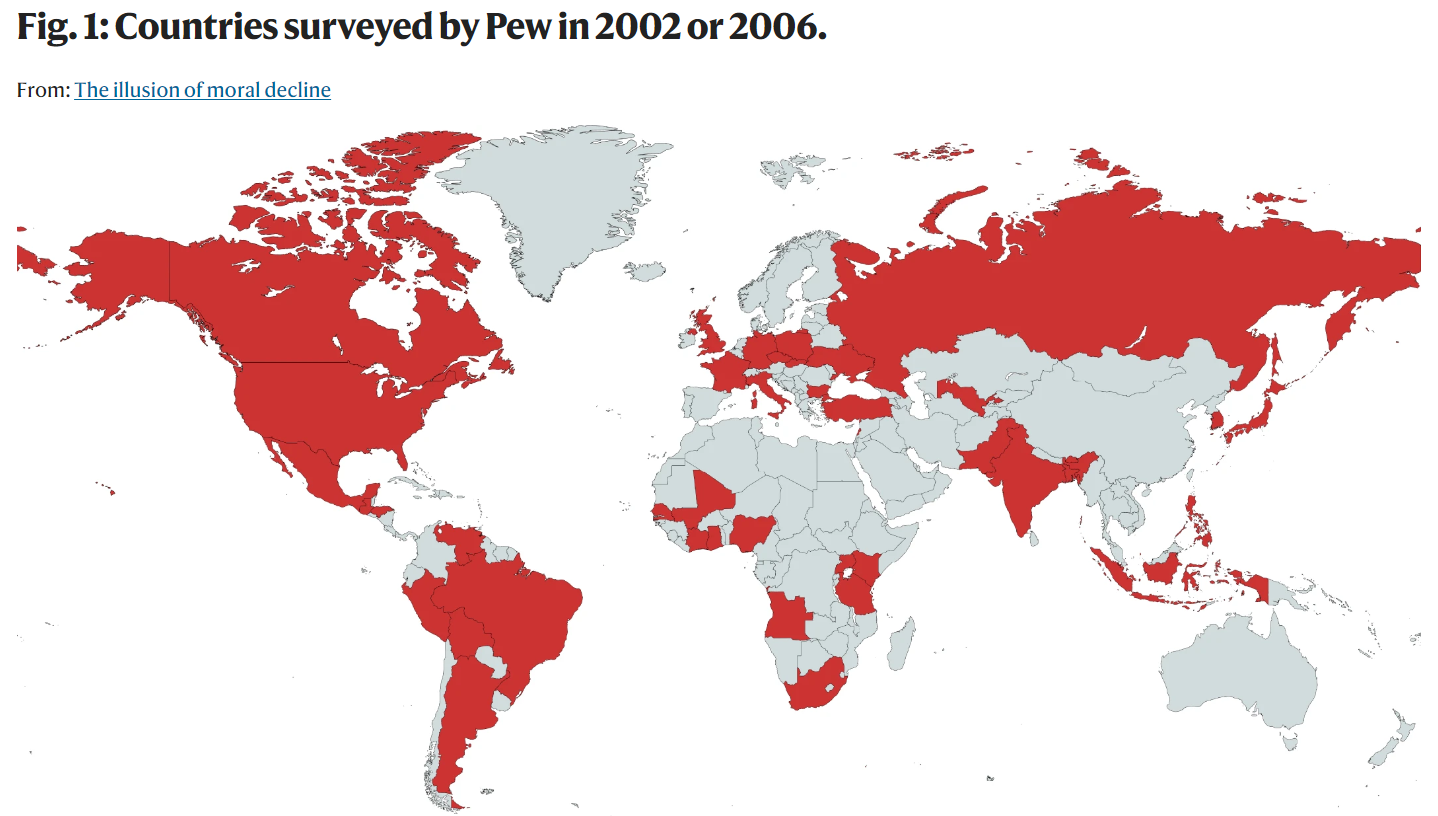The NYT published an opinion piece about the recent publication of a massive, worldwide study about human beliefs about moral decline. The opinion was written by the senior author of the study, psychologist Adam Mastroianni at Columbia University. The data indicates that belief in moral decline compared to the "good old days" is a universal human illusion. The same thing is seen in all countries examined so far. The NYT writes:
Your Brain Has Tricked You Into Thinking Everything Is WorsePerhaps no political promise is more potent or universal than the vow to restore a golden age. From Caesar Augustus to the Medicis and Adolf Hitler, from President Xi Jinping of China and President “Bongbong” Marcos Jr. of the Philippines to Donald Trump’s “Make America Great Again” and Joe Biden’s “America Is Back,” leaders have gained power by vowing a return to the good old days.
What these political myths have in common is an understanding that the golden age is definitely not right now. Maybe we’ve been changing from angels into demons for centuries, and people have only now noticed the horns sprouting on their neighbors’ foreheads.While previous researchers have theorized about why people might believe things have gotten worse, we are the first to investigate this belief all over the world, to test its veracity and to explain where it comes from.
We first collected 235 surveys with over 574,000 responses total and found that, overwhelmingly, people believe that humans are less kind, honest, ethical and moral today than they were in the past. People have believed in this moral decline at least since pollsters started asking about it in 1949, they believe it in every single country that has ever been surveyed (59 and counting), they believe that it’s been happening their whole lives and they believe it’s still happening today. Respondents of all sorts — young and old, liberal and conservative, white and Black — consistently agreed: the golden age of human kindness is long gone.
We also found strong evidence that people are wrong about this decline.Other researchers’ data have even shown moral improvement. Social scientists have been measuring cooperation rates between strangers in lab-based economic games for decades, and a recent meta-analysis found — contrary to the authors’ expectations — that cooperation has increased 8 percentage points over the last 61 years.
Two well-established psychological phenomena could combine to produce this illusion of moral decline. First, there’s biased exposure: People predominantly encounter and pay attention to negative information about others — mischief and misdeeds make the news and dominate our conversations.
Second, there’s biased memory: The negativity of negative information fades faster than the positivity of positive information. Getting dumped, for instance, hurts in the moment, but as you rationalize, reframe and distance yourself from the memory, the sting fades. The memory of meeting your current spouse, on the other hand, probably still makes you smile.
When you put these two cognitive mechanisms together, you can create an illusion of decline.
Thanks to biased exposure, things look bad every day. But thanks to biased memory, when you think back to yesterday, you don’t remember things being so bad. When you’re standing in a wasteland but remember a wonderland, the only reasonable conclusion is that things have gotten worse.
That explanation fits well with two more of our surprising findings. First, people exempt their own social circles from decline; in fact, they think the people they know are nicer than ever. This might be because people primarily encounter positive information about people they know, which our model predicts can create an illusion of improvement.
Second, people believe that moral decline began only after they arrived on Earth; they see humanity as stably virtuous in the decades before their birth. This especially suggests that biased memory plays a role in producing the illusion.If these cognitive biases are working in tandem, our susceptibility to golden age myths makes a lot more sense. Our biased attention means we’ll always feel like we’re living in dark times, and our biased memory means we’ll always feel like the past was brighter.
As long as we believe in this illusion, we are susceptible to the promises of aspiring autocrats who claim they can return us to a golden age that exists in the only place a golden age has ever existed: our imaginations.
Well now, that tosses some sand in the gears. First, humans are bombarded with negative stuff like mischief, misdeeds and miscreancy = biased exposure. Second, the human mind tends to whitewash negative experiences over time = biased memory. Together, those two stinkers** (biases) tend to create an illusion of moral decline. That tends to attract demagogues and regular politicians like the moth to the flame. Those promises tend to bamboozle a lot of people.
** Or, maybe not completely stinkers. Maybe whitewashing painful past personal experiences makes life easier for some or most people.
Qs: Waddabout the real, not illusory, decline in respect for and reliance on facts, true truths and sound reasoning, especially when they are inconvenient, that America's political radical right is undeniably heavily invested in? Does fidelity to facts, true truths and sound reasoning even constitute a moral value? In a democracy, are lies to the public immoral, or if malice is there, evil?[1] How about lies in a dictatorship or theocracy?
Footnote:
1. Consider our good friend Sissela Bok commenting on lies and deceit of the public in a democracy in her 1999 book, Lying: Moral Choice in Public and Private Life:

No comments:
Post a Comment